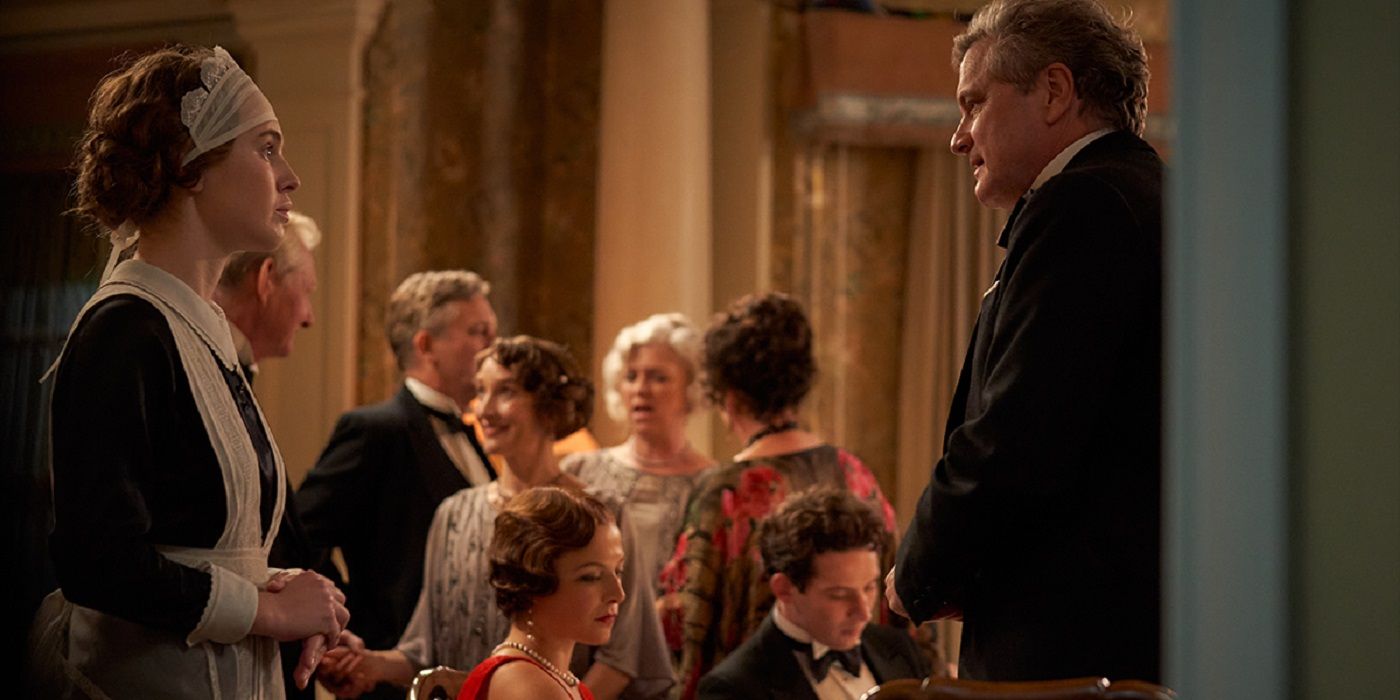Grief permeates Mothering Sunday, suffocating every aspect of the characters’ lives, weighing heavily on their minds and encroaching on the daily joys that once existed in the years prior. It ebbs and flows, influences, and also inspires, but is never forgotten; even as the years and life goes on, the aching feeling remains, the collective loss so overwhelming that to continue functioning often feels nearly impossible. Directed by Eva Husson from a screenplay by Alice Birch, Mothering Sunday (based on the novel by Graham Swift) leans into the heaviness of grief in the years after World War I. The film is tender and thoughtful in its exploration of loss, lingering in the details and memories shaping life, almost reverent in its approach.
Mothering Sunday follows Jane Fairchild (Odessa Young), a maid working for the Nivens (Colin Firth and Olivia Colman) in the countryside of England. The Nivens have lost their two sons to the war and their every interaction with each other depicts how strained their relationship has become since. Jane keeps to herself for the most part, but her affair with Paul Sheringham (Josh O’Connor), the son of the Nivens’ friends and neighbors, involves her in the heavy emotions and stories of the family. The story primarily takes place on Mother’s Day in 1924, though the film sets off to visit Jane’s future and her relationship with Donald (Sope Dirisu) at various points.
Donald tells Jane that because she was sent to become a servant at an early age, she became an “occupational observer of life,” which is exactly how Husson approaches the film’s premise. Jane watches, listens, taking in every detail as though to commit it to memory. There’s a deep sense of inescapable loss and the story never shies away from it, even when it’s never addressed. It cycles through each character’s coping mechanism — namely, it’s to avoid discussing the Nivens and Sheringham’s sons at all, much less mentioning them by name. For Paul, however, talking about his brothers to Jane keeps their memory alive, even if he can’t bring them up around his family, whose silence is deafening. In a turn of events, it’s Jane who is charged with maintaining all of their memories, their stories and sorrows living on in the turning pages of Jane’s book or the hazy recollection of her mind.
Husson focuses a lot on the minute details: a flower petal at full bloom, hidden pictures that speak of a time the families can never get back to, fingers lingering on the spines of books, characters dressing and undressing at various points. The director’s use of close-ups maintain the intimacy of the story, with Jamie Ramsay’s cinematography spectacularly capturing the melancholic mood that settles deeply into the film’s very core. The dialogue, graceful and poetic as it is, is never exaggerated or inauthentic. Rather, the conversations between Jane and Paul and, later, Jane and Donald, are tender and calm, effectively edited (by Emilie Orsini) to intensify emotional moments. The film, more than anything, poignantly captures loss. The feelings are visceral, daunting and heavy, like a grip that refuses to let go.
There is a powerful moment, in which Colman’s Mrs. Niven tells Young’s Jane that she is lucky to have no family; that way, she’s got nothing to lose. And yet, loss cannot be measured against another's, though the scene highlights how grief may affect the differing classes. Mrs. Niven has the privilege to sit in her loss for a long time, to think nothing but of the sons she’ll never see again. Jane, however, must go on with her life, finding ways to cope without stopping because she has to, hiding her grief as though it’s not as important as the Nivens’ or the Sheringham’s. It’s an intriguing dynamic and a unique lens to explore the heartache of death and those it leaves behind.
At the center of it all is Odessa Young, whose performance is moving and calm, with an undercurrent of mournful heaviness that seeps into her character. Mothering Sunday isn’t all sadness and tears, though, and Young’s back-and-forth with Josh O’Connor is filled with as much fleeting joy and charming banter as it is heartbreak over death and impending marriages. Colin Firth and Olivia Colman, who are in pivotal, but much smaller roles, are equally as good. The film doesn’t always flow so smoothly, however, and there are instances where the flash-forward scenes are jarring, deterring from the primary time period in which the story is set. Regardless of this, Mothering Sunday is a powerful and beautifully told story, gentle in its approach, careful in its execution, and heartbreakingly effective in all of its joy and sadness.
Mothering Sunday had its premiere at the Toronto International Film Festival on September 10, 2021. The film will be released in theaters on November 19. Its runtime is 110 minutes and it is rated R for sexual content, graphic nudity and some language.

